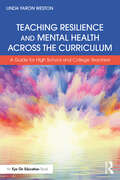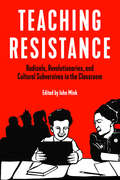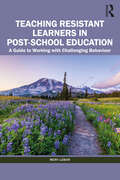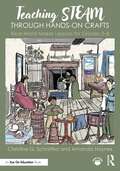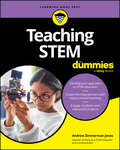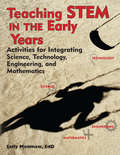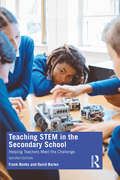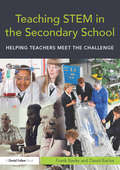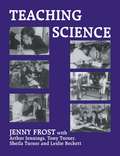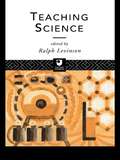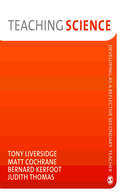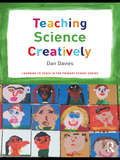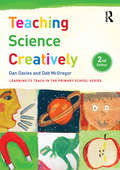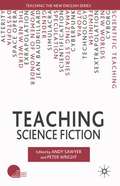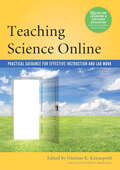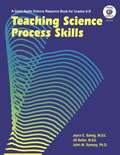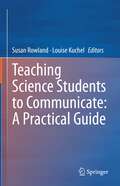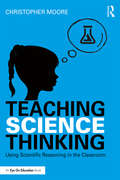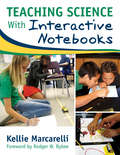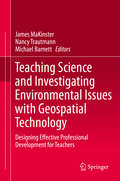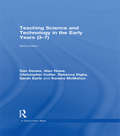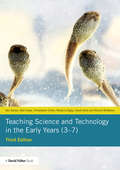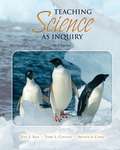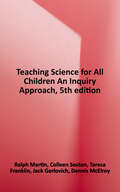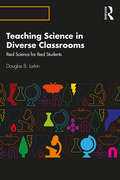- Table View
- List View
Teaching Resilience and Mental Health Across the Curriculum: A Guide for High School and College Teachers
by Linda Yaron WestonWritten by a teacher for teachers, Teaching Resilience and Mental Health Across the Curriculum is an integrative approach to pedagogy for educators at the high school and college level to survive, thrive, and sustain in the profession. Blending theory, research, and practice for a comprehensive program for teachers to incorporate well-being tools into the classroom, each of the book’s five foundations includes engaging information, strategies, real-world examples, interactive reflection questions, and activities that can be directly applied to teaching and life. Practical guidance in designing real-world curriculum is offered alongside accessible strategies for engagement, investment, and active learning in student-centered classrooms. An essential guide for teachers, it includes techniques for incorporating well-being that are grounded in culturally responsive teaching, trauma-informed instruction, mental health, resilience, and emotional literacy. Teachers will also gain insight on how to make the career sustainable through practices for self-compassion and authentic self-care so they can not only survive, but flourish in and out of school. For all the challenges that students and teachers face, this book defines what it means, and what it takes, to teach in today’s classrooms.
Teaching Resistance: Radicals, Revolutionaries, and Cultural Subversives in the Classroom
by John MinkTeaching Resistance is a collection of the voices of activist educators from around the world who engage inside and outside the classroom from pre-kindergarten to university and emphasize teaching radical practice from the field. Written in accessible language, this book is for anyone who wants to explore new ways to subvert educational systems and institutions, transform educational spaces, and empower students and teachers to fight for genuine change. Topics include community self-defense, Black Lives Matter and critical race theory, intersections between punk/DIY subculture and teaching, ESL, anarchist education, Palestinian resistance, trauma, working-class education, prison teaching, the resurgence of (and resistance to) the Far Right, special education, antifascist pedagogies, and more. Edited by social studies teacher, author, and punk musician John Mink, the book features expanded entries from the monthly column in the politically insurgent punk magazine Maximum Rocknroll, plus new works and interviews with subversive educators. Contributing teachers include Michelle Cruz Gonzales, Dwayne Dixon, Martín Sorrondeguy, Alice Bag, Miriam Klein Stahl, Ron Scapp, Kadijah Means, Mimi Nguyen, Murad Tamini, Yvette Felarca, Jessica Mills, and others.
Teaching Resistant Learners in Post-School Education: A Guide to Working with Challenging Behaviour
by Merv LeborThis book explores various frameworks within which post-school education is situated and the practice that actually happens in classrooms and lecture theatres, especially when things go wrong. Examining how and why some students choose to resist learning whilst undertaking tertiary education, this book provides practical tips and guidance for educators on how to work through difficult situations where learning isn’t a student’s priority. Considering both theory and practice, the book offers a range of practical solutions to difficult circumstances, such as the greater emphasis on distance learning, the growth of predatory or fake journals to the challenges of too much screen time, ghostwriters and plagiarism, speaking out of turn, consistent lateness, absenteeism and even violent behaviour. Looking at contexts and behaviours where learning is rejected or ignored, through students’ indifference or resistance, from a range of perspectives, this book is ideal reading for anyone working or involved in tertiary education, including teacher trainees, tutors, teacher educators, managers, administrators and lecturers working at universities and colleges, as well as students who may benefit from discussions of the problematic nature of learning.
Teaching STEAM Through Hands-On Crafts: Real-World Maker Lessons for Grades 3-8
by Amanda Haynes Christine G. SchnittkaHelp your students connect historic technologies with today’s STEAM concepts through the lens of crafting! This book, written by a science education professor and a middle school STEM teacher, provides guidance for turning classic crafts into transdisciplinary STEAM lessons for grades 3–8. Ready-to-use lessons outline the history, science, mathematics, and engineering embedded within ten hands-on crafts from around the world. Each chapter outlines the history of a craft, its social impact, and the mathematics, engineering, and scientific concepts and skills embedded in the craft. Content standards from art, history, English language arts, technology, mathematics, and science are embedded within each unit. Lessons are supplemented with ready-to-photocopy handouts, guiding questions, and logistical support such as shopping lists and safety procedures. Activities have all been classroom-tested to ensure appropriate leveling and applicability across STEAM disciplines. Ideal for any STEM or STEAM classroom across upper elementary and middle schools, this book helps make STEM concepts meaningful and tangible for your students. Rather than just reading about science, technology, mathematics, or engineering, students will become makers and engage in STEAM directly, just as original crafters have done for centuries.Additional instructional materials are available at: https://steamcrafts.weebly.com/
Teaching STEM For Dummies
by Andrew Zimmerman JonesSpark a passion for STEM Teaching STEM For Dummies is an easy-to-read and exciting new guide for teachers who want to inspire their students with engaging lessons and thoughtful discussions about science, technology, engineering, and mathematics. This practical roadmap to developing hands-on classroom material relevant to the real world shows you how to define STEM topics and overcome the most common challenges to teaching these complex subjects to younger students. You'll learn how you can make STEM more welcoming—using inclusion, scaffolding, and differentiation—and discover resources for STEM teachers you can deploy immediately in your classroom. Inside the book: Understand the STEM concepts students are expected to learn at different grades and how to connect those ideas together in engaging lessons Teach your students the inquisitive mindsets, logical reasoning, and collaboration skills they'll need to succeed in STEM fields Increase STEM inclusivity in both the classroom and the industry by engaging all students in STEM from early ages Discover resources to educate students on the problem-solving concepts at the core of STEM subjects Perfect for teachers, homeschooling parents, tutors, and other educators, Teaching STEM For Dummies is a can't-miss read for anyone who wants to open young minds to the wonders of STEM.
Teaching STEM in the Early Years
by Sally MoomawThe foundation for science, technology, engineering, and mathematics (STEM) education begins in the early years. This book provides more than ninety activities and learning center ideas that seamlessly integrate STEM throughout early childhood classrooms. These hands-on STEM experiences enhance cooking, art, and music activities, block play and sensory table exploration, and field trips and outdoor time. Information on assessment and early learning standards is also provided.Sally Moomaw, EdD, has spent much of her career researching and teaching STEM education. She is an assistant professor at the University of Cincinnati and the author of several early education books.
Teaching STEM in the Secondary School: Helping Teachers Meet The Challenge
by David Barlex Frank BanksThis book looks at the purpose and pedagogy of STEM teaching and explores the ways in which STEM subjects can interact in the curriculum to enhance student understanding, achievement and motivation. By reaching outside their own classroom, teachers can collaborate across STEM subjects to enrich learning and help students relate school science, technology and maths to the wider world. Packed with ideas and practical details for teachers of STEM subjects, the new revised edition of this book: ■ considers what the STEM subjects contribute separately to the curriculum and how they relate to each other in the wider education of secondary school students; ■ describes and evaluates different curriculum models for STEM; ■ suggests ways in which a critical approach to the pedagogy of the classroom, laboratory and workshop can support and encourage all pupils to engage fully in STEM; ■ addresses the practicalities of introducing, organising and sustaining STEM-related activities in the secondary school; ■ looks to ways schools can manage and sustain STEM approaches in the long-term. This new revised edition is essential reading for trainee and practising teachers, those engaged in further professional development and all who wish to make the learning of science, technology, engineering and mathematics an interesting, motivating and exciting experience for their students.
Teaching STEM in the Secondary School: Helping teachers meet the challenge
by David Barlex Frank BanksThe skills, knowledge and understanding of the subjects involved in STEM (Science, Technology, Engineering and Mathematics) are vital for all young people in an increasingly science- and technology-driven society. This book looks at the purpose and pedagogy of STEM teaching and explores the ways in which STEM subjects can interact in the curriculum to enhance student understanding, achievement and motivation. By reaching outside their own classroom, teachers can collaborate across subjects to enrich learning and help students relate school science, technology and maths to the wider world. Packed with ideas and practical details for teachers of STEM subjects, this book: considers what the STEM subjects contribute separately to the curriculum and how they relate to each other in the wider education of secondary school students describes and evaluates different curriculum models for STEM suggests ways in which a critical approach to the pedagogy of the classroom, laboratory and workshop can support STEM for all students addresses the practicalities of introducing, organising and sustaining STEM-related activities in the secondary school looks to ways schools can manage and sustain STEM approaches in the long-term. This timely new text is essential reading for trainee and practising teachers who wish to make the learning of Science, Technology, Engineering and Mathematics an interesting, motivating and exciting experience for their students.
Teaching Science
by Jenny Frost Richard B. IngleFirst published in 1995. Routledge is an imprint of Taylor & Francis, an informa company.
Teaching Science
by Ralph LevinsonScience education has undergone far-reaching changes in the last fifty years. The articles collected together in this reader examine how we have reached our present consensus and what theories we now use to explain how children learn science. The central sections of the reader examine how all this can be translated into effective and stimulating teaching, how learning can be most accurately and fairly assessed and how the impact of gender, ethnicity and other factors on children's performance can be addressed in methods of teaching which make science accessible to all. The articles in the final section of the book are a reminder that the debate is not finished yet and raise some challenging questions about what science education is and what it is for.
Teaching Science (Developing as a Reflective Secondary Teacher)
by Judith Thomas Matt Cochrane Mr Bernard Kerfoot Dr Tony LiversidgeReflective practice is at the heart of effective teaching, and this book helps you develop into a reflective teacher of Science. Everything you need is here: guidance on developing your analysis and self-evaluation skills, the knowledge of what you are trying to achieve and why, and examples of how experienced teachers deliver successful lessons. It includes advice about obtaining your first teaching post, and about continuing professional development. The book shows you how to plan creative lessons, how to make good use of resources and how to assess pupils' progress effectively. Each chapter contains points for reflection, which encourage you to break off from your reading and think about the challenging questions that you face as a new teacher. The book comes with access to a companion website, www.sagepub.co.uk/secondary, where you will find: - Videos of real lessons so you can see the skills discussed in the text in action - Links to a range of sites that provide useful additional support - Extra planning and resource materials. If you are training to teach science this book will help you to improve your classroom performance, by providing you with practical advice, but also by helping you to think in depth about the key issues. It also supplements guidance on undertaking a research project with examples of the research evidence that is needed in academic work at Masters level, essential for anyone undertaking an M-level PGCE.
Teaching Science Creatively
by Dan Davies Deb McGregorHow can you unlock your own creativity to help children learn science creatively? How do you bring the world of ‘real science’ into the classroom? Where does science fit in a creative curriculum? Teaching Science Creatively explores how creative teaching can harness primary-aged children’s sense of wonder about the world around them. It offers innovative starting points to enhance your teaching and highlights curiosity, observation, exploration and enquiry as central components of children’s creative learning in science. Illustrated throughout with examples from the classroom and beyond, this book explores the core elements of creative practice supporting both teacher and children to develop their knowledge and skills. Key themes include: The importance of science in a creative primary curriculum The role of play in early scientific learning Developing children’s own interests and ideas into creative enquiry How theories of learning can help you understand children’s creative development Teaching science topics in innovative and creative ways - games, drama, role play, puppets, mini-safaris and welly walks! Using new technologies to enhance your science teaching in the classroom and outdoors Stimulating and accessible, with contemporary and cutting-edge practice at the forefront, Teaching Science Creatively introduces new ideas to support and motivate new and experienced primary teachers. It is an essential purchase for any professional who wishes to incorporate creative approaches to teaching science in their classroom.
Teaching Science Creatively (Learning to Teach in the Primary School Series)
by Dan Davies Deb McGregorHow can you unlock your own creativity to help children learn science creatively? How do you bring the world of ‘real science’ into the classroom? Where does science fit in a creative curriculum? This second edition of Teaching Science Creatively has been fully updated to reflect new research, initiatives and developments in the field. It offers innovative starting points to enhance your teaching and highlights curiosity, observation, exploration and enquiry as central components of children’s creative learning in science. Illustrated throughout with examples from the classroom and beyond, the book explores how creative teaching can harness children’s sense of wonder about the world around them. With easily accessible chapters, it offers a comprehensive introduction to the core elements of creative science learning, supporting both teacher and child in developing scientific concepts and skills. The book explores key issues such as: • the links between scientific and creative processes• how to teach creatively, and for creativity• the role of play in early scientific learning• developing scientific understanding through drama (new)• using the outdoors in science• how theories of learning relate to children’s creative development• teaching science topics in innovative and creative ways – games, drama, role play, puppets, mini-safaris and welly walks! Stimulating and accessible, with contemporary and cutting-edge practice at the forefront, Teaching Science Creatively introduces fresh ideas to support and motivate both new and experienced primary teachers. It is an essential purchase for any professional who wishes to incorporate creative approaches to teaching science in their classroom.
Teaching Science Fiction
by Peter Wright Andy SawyerTeaching Science Fiction is the first text in thirty years to explore the pedagogic potential of that most intellectually stimulating and provocative form of popular literature: science fiction. Innovative and academically lively, it offers valuable insights into how SF can be taught historically, culturally and practically at university level.
Teaching Science Online: Practical Guidance for Effective Instruction and Lab Work
by Dietmar K. KennepohlWith the increasing focus on science education, growing attention is being paid to how science is taught. Educators in science and science-related disciplines are recognizing that distance delivery opens up new opportunities for delivering information, providing interactivity, collaborative opportunities and feedback, as well as for increasing access for students. This book presents the guidance of expert science educators from the US and from around the globe. They describe key concepts, delivery modes and emerging technologies, and offer models of practice. The book places particular emphasis on experimentation, lab and field work as they are fundamentally part of the education in most scientific disciplines. Chapters include:* Discipline methodology and teaching strategies in the specific areas of physics, biology, chemistry and earth sciences.* An overview of the important and appropriate learning technologies (ICTs) for each major science.* Best practices for establishing and maintaining a successful course online.* Insights and tips for handling practical components like laboratories and field work.* Coverage of breaking topics, including MOOCs, learning analytics, open educational resources and m-learning.* Strategies for engaging your students online.
Teaching Science Process Skills
by John Ramsey Joyce Ramig Jill BailerYour students will be engaged with these high-interest inquiry-based experiments that will help develop important science process skills such as observing, hypothesizing, predicting, inferring, and investigating. Teacher notes are included for every activity as well as forms and guidelines for independent lab investigations. This invaluable book for middle school students hones in on skills necessary for achieving desired results on standardized tests and Project 2061 science initiatives. Excite your students and your science curriculum with Teaching Science Process Skills.
Teaching Science Students to Communicate: A Practical Guide
by Susan Rowland Louise KuchelThis highly-readable book addresses how to teach effective communication in science. The first part of the book provides accessible context and theory about communicating science well, and is written by experts. The second part focuses on the practice of teaching communication in science, with ‘nuts and bolts’ lesson plans direct from the pens of practitioners. The book includes over 50 practice chapters, each focusing on one or more short teaching activities to target a specific aspect of communication, such as writing, speaking and listening. Implementing the activities is made easy with class run sheets, tips and tricks for instructors, signposts to related exercises and theory chapters, and further resources. Theory chapters help build instructor confidence and knowledge on the topic of communicating science. The teaching exercises can be used with science students at all levels of education in any discipline and curriculum – the only limitation is a wish to learn to communicate better! Targeted at science faculty members, this book aims to improve and enrich communication teaching within the science curriculum, so that science graduates can communicate better as professionals in their discipline and future workplace.
Teaching Science Thinking: Using Scientific Reasoning in the Classroom
by Christopher MooreTeach your students how to think like scientists. This book shows you practical ways to incorporate science thinking in your classroom using simple "Thinking Tasks" that you can insert into any lesson. What is science thinking and how can you possibly teach and assess it? How is science thinking incorporated into the Next Generation Science Standards (NGSS) and how can it be weaved into your curriculum? This book answers these questions. This practical book provides a clear, research-verified framework for helping students develop scientific thinking as required by the NGSS. Your students will not be memorizing content but will become engaged in the real work scientists do, using critical thinking patterns such as: Recognizing patterns, Inventing new hypotheses based on observations, Separating causes from correlations, Determining relevant variables and isolating them, Testing hypotheses, and Thinking about their own thinking and the relative value of evidence. The book includes a variety of sample classroom activities and rubrics, as well as frameworks for creating your own tools. Designed for the busy teacher, this book also shows you quick and simple ways to add deep science thinking to existing lessons.
Teaching Science With Interactive Notebooks
by Kellie MarcarelliIncrease student learning in the inquiry-based science classroom! Interactive notebooks allow students to record observations, reflect on learning, and self-assess their work. Packed with student examples, this detailed guide explains the unique features that make interactive notebooks more effective tools than conventional notebooks for science classrooms. This resource: Describes the nuts and bolts of implementing interactive notebooks, including execution, time management, and grading Uses the 5E Learning Cycle as the framework for science instruction Emphasizes the importance of writing in science and provides strategies for modeling effective writing Explores strategies to encourage collaborative student inquiry and foster whole-class discussions
Teaching Science and Investigating Environmental Issues with Geospatial Technology
by Michael Barnett Nancy Trautmann James MakinsterThe emerging field of using geospatial technology to teach science and environmental education presents an excellent opportunity to discover the ways in which educators use research-grounded pedagogical commitments in combination with their practical experiences to design and implement effective teacher professional development projects. Often missing from the literature are in-depth, explicit discussions of why and how educators choose to provide certain experiences and resources for the teachers with whom they work, and the resulting outcomes. The first half of this book will enable science and environmental educators to share the nature and structure of large scale professional development projects while discussing the theoretical commitments that undergird their work. Many chapters will include temporal aspects that present the ways in which projects change over time in response to evaluative research and practical experience. In the second half of the book, faculty and others whose focus is on national and international scales will share the ways in which they are working to meet the growing needs of teachers across the globe to incorporate geospatial technology into their science teaching. These efforts reflect the ongoing conversations in science education, geography, and the geospatial industry in ways that embody the opportunities and challenges inherent to this field. This edited book will serve to define the field of teacher professional development for teaching science using geospatial technology. As such, it will identify short term and long term objectives for science, environmental, and geography educators involved in these efforts. As a result, this book will provide a framework for future projects and research in this exciting and growing field.
Teaching Science and Technology in the Early Years (3–7)
by Christopher Collier Dan Davies Alan Howe Sarah Earle Kendra McMahon Rebecca DigbyTeaching Science and Technology in the Early Years (3-7) celebrates young children’s amazing capabilities as scientists, designers and technologists. Research-based yet practical and accessible, it demonstrates how scientific, designing and making activities are natural to young children, and have the potential for contributing to all aspects of their learning. By identifying the scientific and design-related concepts, skills and activities being developed, the book enables the reader to make more focused diagnostic observations of young children and plan for how they can help move them forward in their learning. This second edition has been thoroughly updated and features: Six new chapters providing practical advice and examples for enhancing scientific and technological learning through thematic approaches a new chapter focusing on the outdoor learning environment and how this can support science and technology new case studies of successful early years practice, alongside examples of practical planning for learning, and advice on documenting children’s learning stories, guidance on the role of talk, narrative, documentation and planning in relation to early years science and technology Based on the latest research and the first hand experience, this practical and accessible book is essential reading for early years and primary students on undergraduate and Masters level courses. ? ? ?
Teaching Science and Technology in the Early Years (3–7)
by Christopher Collier Dan Davies Alan Howe Sarah Earle Kendra McMahon Rebecca DigbyTeaching Science and Technology in the Early Years (3–7) celebrates young children’s amazing capabilities as scientists, designers and technologists. Research-based yet practical and accessible, it demonstrates how scientific designing and making activities are natural to young children, and have the potential for contributing to all aspects of their learning. By identifying the scientific and technological concepts, skills and activities being developed, the book enables the reader to make more focused diagnostic observations of young children and plan for how they can help move them forward in their learning. This third edition has been thoroughly updated and features: fresh insights into young children’s learning from neuroscience and ‘new-materialist’ perspectives; a UK-wide perspective on Early Years curricula and how they support the inclusion of science and technology as an entitlement for young children; new case studies of successful, evidence-based Early Years practice, alongside new examples of practical planning for learning, and advice on documenting children’s learning stories; an updated chapter on assessing and documenting children’s learning, drawing upon findings from the Teacher Assessment in Primary Science (TAPS) project at Bath Spa University. Based on the latest research and first-hand experience, this practical and accessible book is essential reading for Early Years and Primary students on undergraduate, PGCE and Masters-level courses.
Teaching Science as Inquiry
by Terry L. Contant Arthur A. Carin Joel E. BassResearch tells us that an inquiry approach to science teaching motivates and engages every type of student, helping them understand science's relevance to their lives, as well as the nature of science itself. Teaching Science as Inquiry demonstrates a manageable way for new and experienced teachers to bring inquiry successfully into the science classroom through a 2-part structure: Methods for Teaching Science as Inquiry and Activities for Teaching Science as Inquiry. The Methods portion scaffolds concepts and illustrates instructional models to help readers understand the inquiry approach to teaching. The Activities portion follows the 5-E model (Engage, Explore, Explain, Elaborate, Evaluate), a Learning Cycle model introduced in the methods chapters that reflects the NSES Science as Inquiry Standards. With a new theme of "accountable inquiry," this leading methods text has a renewed focus on assessment (focusing on backwards planning, aligning objectives with assessments, and how to develop understanding of concepts that appear on standardized tests throughout the process of inquiry).
Teaching Science for All Children: An Inquiry Approach, Fifth edition
by Colleen Sexton Ralph Martin Teresa Franklin Jack Gerlovich Dennis McElroyThe Fifth Edition of this popular elementary science methods text emphasizes learning science through inquiry, implementation of the Learning Cycle, NSE standards, constructivism, technology, and strategies for teaching diverse learners. Teaching Science for All Children employs an inquiry model throughout, especially apparent in the design of its learning cycle lesson plans.
Teaching Science in Diverse Classrooms: Real Science for Real Students
by Douglas B. LarkinAs a distinctive voice in science education writing, Douglas Larkin provides a fresh perspective for science teachers who work to make real science accessible to all K-12 students. Through compelling anecdotes and vignettes, this book draws deeply on research to present a vision of successful and inspiring science teaching that builds upon the prior knowledge, experiences, and interests of students. With empathy for the challenges faced by contemporary science teachers, Teaching Science in Diverse Classrooms encourages teachers to embrace the intellectual task of engaging their students in learning science, and offers an abundance of examples of what high-quality science teaching for all students looks like. Divided into three sections, this book is a connected set of chapters around the central idea that the decisions made by good science teachers help light the way for their students along both familiar and unfamiliar pathways to understanding. The book addresses topics and issues that occur in the daily lives and career arcs of science teachers such as: • Aiming for culturally relevant science teaching • Eliciting and working with students’ ideas • Introducing discussion and debate • Reshaping school science with scientific practices • Viewing science teachers as science learners Grounded in the Next Generation Science Standards (NGSS), this is a perfect supplementary resource for both preservice and inservice teachers and teacher educators that addresses the intellectual challenges of teaching science in contemporary classrooms and models how to enact effective, reform
